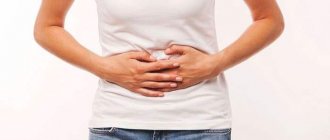Why does your stomach swell before your period?
The cycle reflects the complex hormonal processes occurring in a woman’s body. Throughout the reproductive period, monthly changes in the level of sex steroids are observed, the main of which gynecologists call:
If estrogen levels peak around ovulation, a significant amount of progesterone is produced on the eve of menstruation. PMS is a consequence of decreased estrogen production while increasing progesterone.
The abdomen swells during menstrual periods due to the following hormonal factors:
- Endometrial proliferation. Estrogens promote the growth of the endometrium. Sufficient thickness of the inner layer of the uterus is a necessary condition for implantation of the fertilized egg in the event of fertilization of a female egg by a male sperm. A swollen uterus affects the intestines, causing visual enlargement in the abdominal area. After detachment of the functional layer of the endometrium, the size of the uterine body returns to its original values.
- Swelling. Under the influence of sex hormones, fluid accumulates in the tissues of the body. This mechanism prevents blood loss during menstruation.
- Ovulation. The release of the egg from the follicle is accompanied by a hormonal surge. Increased gas formation and flatulence before menstruation are caused by the active production of progesterone. This hormone has a relaxing effect on the digestive tract.
Experts name the following reasons for bloating before menstruation:
- Features of intestinal motility. A few days before your period, blood flow to the ovaries and uterus increases. The intestinal walls are subject to compression, which causes spasms. The movement of food is uneven. This is why it often swells during menstruation. Digestive and stool disturbances may occur.
- Pregnancy. If your stomach swells before your period, you may have conceived. Progesterone causes changes in the female body for pregnancy and subsequent birth of a child.
- Binge eating. A big belly during menstruation may be the result of overeating. Increased appetite is a side effect of progesterone, which causes hunger. Typically, women experience cravings for salty and sweet foods that retain fluid in the body. Gas during menstruation occurs due to poor digestion of large amounts of food.
Sometimes the stomach is inflated as a result of pathological conditions:
- Diseases of the digestive tract. Exacerbation of colitis or gastroduodenitis is often observed during menstruation due to the accumulation of water and blood in the abdominal cavity. The gases produced lead to flatulence, cramps, nausea and constipation. Pain may occur in the lower abdomen.
- Diseases of the genitourinary system. Fluid is retained in tissues during pathological conditions of the kidneys. After the onset of menstruation, the number of urinations decreases. In women, the stomach swells, swelling appears, and blood pressure rises.
- Gynecological pathologies. Inflammatory processes and benign tumors are characterized by acute pain that can radiate to the anus and sacrum. The abdomen is inflated with adhesive disease, adnexitis, formations of the uterus and ovaries.
Bloat during ovulation
Many women experience bloating after their period, around the middle of their cycle. This may indicate a period of ovulation, which is sometimes accompanied by painful pulling sensations, bowel irregularities, and general malaise. This condition usually goes away within two days, and sometimes within a few hours. To confirm the release of the egg, you can use special rapid tests.
For many women, bloating occurs in the middle of the menstrual cycle, during the period of ovulation - the release of a mature egg from the ovary. Ovulation itself is a painful process, since it is associated with rupture of the follicle.
It is not uncommon to experience weakness, loss of strength, enlargement of the abdominal cavity, flatulence, a feeling of fullness in the abdominal cavity, and nagging pain.
During a normal menstrual cycle, such symptoms do not last long and do not cause severe discomfort to the woman. If such symptoms appear for the first time or their severity has become stronger, it is worth visiting a doctor, since ovulation may be accompanied by intestinal diseases or metabolic disorders in the body.
How many days before menstruation does bloating appear?
Abdominal enlargement before menstruation is individual. The belly swells 2-3 days before menstruation. Some women notice bloating 1.5-2 weeks before the onset of their period. Sometimes the belly increases during menstruation, which depends on the following factors:
- body features;
- physical fitness (pumped up or weak abs);
- elasticity of the muscles of the uterus, which weakens after childbirth.
In young girls who play sports, the belly does not increase before menstruation. An increase of 2 kg in weight is observed in women who have given birth and overweight women. As a rule, on the 3rd day of the cycle, waist size and weight return to normal.
Nutrition and drinking regimen
To avoid unwanted flatulence, you should not overeat or overeat before bed. Perhaps this is the key factor that provokes bloating. Also, you should not consume the following products that cause gas formation:
- fast food;
- fat meat;
- smoked meats;
- sweets and confectionery.
Before menstruation begins, many women note that their appetite increases 3-4 times.
This is due to a decrease in the production of certain hormones. To avoid overeating, you should include foods such as:
- nuts;
- dried apricots;
- prunes;
- dark dark chocolate;
- bananas;
- canned stewed meat.
It is also important to maintain water balance. You should drink a lot (at least 2 liters), but in small portions, so as not to provoke stomach irritation.
Water will help equalize pressure, reducing fluid loss along with menstruation.
What to do about bloating during menstruation
When the stomach is inflated, you can use medications and traditional medicine.
Medicines for bloating during menstruation
Depending on the cause of the increase in waist size and flatulence, the following medications can be used:
- antispasmodics (Spazmalgon, No-shpu, Drotaverine) for uterine and intestinal spasms;
- carminatives (Espumizan) for increased gas formation;
- enterosorbents (Smecta), if the abdominal cavity is inflated due to flatulence and stool disturbances are present.
Folk remedies for bloating before menstruation
In the absence of pathologies from the digestive system during menstruation, it is useful to add to the diet:
- parsley decoction;
- dill water;
- water infusion of cumin;
- crushed carrot seeds (cumin, dill);
- potato juice;
- Mint tea.
Diet for flatulence before menstruation
If the abdominal cavity inflates during menstruation, you must adhere to the rules of a healthy diet:
- It is recommended to reduce the portion size and increase the number of meals.
- It is advisable to limit or exclude from the diet foods that cause flatulence.
- You need to consume less sugar and salt, which retain fluid in the body and create additional stress on the heart.
- It is better to replace coffee and strong tea, which contribute to flatulence, with plain water.
- For concomitant pain syndrome, herbal teas and fruit drinks made from cranberries and lingonberries are useful.
Diagnostics
To detect the reasons why weight increases and the belly grows during menstruation, it is necessary to undergo a comprehensive diagnosis. It begins with a visit to the gynecologist at the end of the critical days. Next, the doctor will definitely prescribe tests, including a vaginal smear, and an ultrasound. Depending on the results obtained, additional examinations of the intestines, stomach, kidneys, bladder and other organs may be recommended.
As a rule, diagnostic measures are prescribed by a doctor in order to clarify the concomitant diagnosis. The following laboratory and instrumental studies are used:
- General analysis of urine and blood.
- Blood chemistry.
- Coprogram.
- Endoscopy.
- Ultrasound examination of the pelvic and abdominal organs.
- Sometimes more serious examinations may be required. For example, laparoscopy or MRI.
How many days before menstruation does bloating occur?
Quite a lot of women are interested in the following question: how many days before menstruation can bloating appear? Doctors note that such a symptom can manifest itself a few days before menstruation. In addition, it also disappears after 1-2 days.
However, this period can be completely different for each girl. This is due to the fact that there are many reasons that can influence this. One of these factors is that due to the effects of progesterone, a week before menstruation, every woman develops a terrible feeling of hunger, in addition, a stressful state manifests itself, which affects the enlargement of the abdomen.
Prevention of an unpleasant condition
If your stomach becomes larger during menstruation, flatulence and other unpleasant sensations appear, it is important to pay attention to the food that is regularly present in the diet. To prevent bloating you need to:
- Avoid excess salt. Minimize salting of dishes, exclude canned food, homemade preparations, salted fish, nuts and other snacks. Salt retains water and causes severe bloating.
- Reduce your consumption of sweets. Sugar, like salt, can cause bloating and provoke sodium deposition.
- Increase your water consumption. It is necessary to drink herbal teas and non-carbonated liquids. It removes harmful substances and improves metabolism. You can increase your fluid intake by increasing the amount of fruits and vegetables in your diet.
- Avoid caffeine. This substance provokes bloating and flatulence, so green tea and coffee should be consumed in limited quantities.
- Increase the amount of foods with vitamins A, E, B. Red berries, mint tea, fermented milk products, unrefined olive oil.
Causes of bloating before menstruation
If we talk about general factors that can influence bloating during menstruation, they are as follows:
- Body type;
- The degree of development of muscles in the abdominal part;
- Elasticity of the uterine muscles.
All these factors are external reasons why the stomach swells before menstruation. Consequently, in girls who are predisposed to be overweight and have underdeveloped abdominal muscles, the possibility of bloating is much higher. Due to the low elasticity of the uterine muscles, the uterus grows in size, which to some extent affects the enlargement of the abdomen.
In addition, there are internal causes of bloating during menstruation:
- Restructuring of hormonal levels. After the ovulatory phase, a woman’s body begins to prepare for the implantation of a fertilized egg. In this regard, a hormonal release occurs, which entails changes in the functioning of various body systems. At the same time, the uterus may change its size, and the number of fat cells also increases. All this can be guaranteed to affect the shape of the abdomen.
- Swelling. The body of a woman, like a man, has its own characteristics. Nature provided for the preparation of the body of the fair sex for menstruation. Menstrual bleeding is characterized by loss of blood and micronutrients. Because of this, before menstruation, the body begins to make reserves of fluid, which is used to compensate for lost blood. As a result of the accumulation of this fluid, various parts of the body, including the stomach, can swell.
- Ovulatory phase. Ovulation is a process that is accompanied by a strong hormonal surge during the menstrual cycle. After this phase, many female representatives may experience a distended belly and increased gas formation.
- Contraction of the intestinal walls (peristalsis). In the PMS, blood flows to the pelvic organs. Due to the fact that the intestines are located very close to them, they are prone to certain changes. Intestinal motility becomes sluggish and is a common cause of bloating, increased gas formation, constipation, digestive disorders and bloating.
- Pathologies. Most often, bloating may be the first sign of pathological processes. Among the most common pathologies, it is worth noting the following: neoplasms of a benign or malignant nature in the pelvic organs, diseases of the gastrointestinal tract and urinary system.
The following symptoms are characteristic of the disease: pain in the lower abdomen, frequent urination, heavy discharge during menstruation, increased body temperature, nausea and dizziness.
The internal prerequisites for the occurrence of bloating during premenstrual syndrome are quite difficult to determine. Since physiological processes take place in the body itself, you cannot see or feel them. Externally, these processes are manifested only by an increase in the volume of the abdomen. In addition, it is worth limiting the consumption of large amounts of salty, sweet and smoked foods, as this also affects bloating and may be accompanied by flatulence.
Pathological problems
A slight increase and bloating in the abdomen before menstruation is quite natural. However, if this process is accompanied by pain, spasms, stool disturbances, the appearance of rumbling and gas formation, then we can talk about the appearance of pathology in the peritoneum.
What kind of pathology has appeared can only be determined by a specialist. Often a woman attributes symptoms of a disease to premenstrual syndrome. It is worth closely monitoring your health and visiting a gynecologist in a timely manner.
Diseases that cause bloating during menstruation are the following:
- colitis or gastroduodenitis or colitis. These diseases are usually chronic in nature, rarely manifesting acute symptoms. A rush of blood to the abdominal cavity and bloating provoke the appearance of gas, constipation, diarrhea, cramps, pain, and pressure on the walls of the abdominal cavity.
- adhesions and inflammatory processes in the pelvic organs. These diseases can cause bloating before menstruation, accompanied by pain, cramps, and rumbling in the abdomen. At the same time, the stool remains normal.
- kidney diseases. This condition is characterized by fluid retention in the body, including before critical days. At the same time, the lower abdomen begins to swell, lower back pain appears, blood pressure rises, and the woman’s general well-being worsens.
Behavior rules
What to do if your stomach swells before your period? The answer to this question can be quite extensive. Gynecologists recommend adhering to the following rules:
- Limit your intake of foods that cause gas: beans, beans, cabbage, cucumbers, milk, lentils, grapes, radishes, etc.
- Consult your doctor to help you create the right diet and diet. First of all, food should be easy to digest and be prepared by boiling or steaming.
- Consume vitamins A, B and C, as well as foods containing the following minerals: potassium, calcium, zinc and magnesium. In this case, asparagus, chicken, hard cheese, broccoli, eggs, buckwheat and nuts work well.
- Limit your salt and sugar intake. Various types of sweets and drinks can cause increased gas formation. Salt should only be added to cooked dishes. You can use a maximum of fifteen grams of salt per day.
- Monitor your water balance. You need to consume at least two and a half liters of liquid per day.
- Before the start of your menstrual cycle, take baths with black pepper or fennel oil. It is not recommended to do this already when your period begins.
- Drink herbal teas. Try not to drink coffee or other drinks containing caffeine.
In addition, experts note that if a girl is under stress, the symptoms will be more pronounced. In this regard, it is recommended to try to distract yourself and relax in the fresh air more often. Wear clothes that are comfortable for you and engage in physical exercises that are primarily aimed at strengthening the abdominal and back muscles.
Bloating during your period is actually very common. Despite this, symptoms can vary significantly from person to person. It is worth noting that it is not recommended to solve this problem yourself. First of all, you should seek qualified help from a specialist. Only he can prescribe the correct treatment method for you.
Doctors' advice
There are symptoms that require immediate consultation with a specialist:
- prolonged and intensifying pain in the lower abdomen, accompanied by nausea and vomiting;
- with increased menstrual flow, when it significantly increases the usual rate;
- black periods are also a reason to go to the hospital, since in this case the doctor can diagnose the development of an infection or inflammation of the genital organs;
- the appearance of an inflammatory process, accompanied by a persistent increase in body temperature, chills, fever, and excessive sweating;
- the presence of an infection characterized by an unpleasant odor, the color of the discharge, and also causing severe itching, pain and stinging when urinating.
In order to have time to eliminate the cause that can cause dangerous pathologies of the woman’s reproductive system, you need to carefully monitor your health and current condition. The last day of your period should be accompanied by slight discharge; unpleasant symptoms are not typical for this period, so if they occur, you should consult a doctor.
Doctors advise women who are prone to bloating before menstruation to undergo an examination to find out if there are any associated pathologies. This condition may indicate diseases of the intestines, pelvic organs, or metabolic disorders. It is worth visiting an endocrinologist, urologist and cardiologist, since it is necessary to exclude the presence of diseases such as neoplasms of the pelvic organs, heart disease, and tumors in the body.
For bloating, many experts recommend:
- switch to proper nutrition, eliminate salty, smoked and spicy foods, alcohol and carbonated drinks. Meals should be healthy and fractional;
- avoid foods that cause swelling;
- Before critical days, you should take a warm bath with black pepper or fennel oil. But when your period begins, you should stop taking warm baths to avoid bleeding;
- wear loose clothing, avoid tight belts, slips and corsets;
- take a course of B vitamins, magnesium and potassium;
- be sexually active;
- lift your spirits;
- take a decoction of cranberries, lingonberries or chamomile.
You shouldn’t deny yourself small joys - it’s not forbidden to boost your mood with a piece of dark chocolate or banana. A sedentary lifestyle can be harmful - you should take walks, swim, and exercise. You should not immediately set sports records - this can harm a woman’s body. A positive outlook on life, joy from communicating with friends and relatives, smiling and laughter can ease the course of premenstrual syndrome.
Your doctor may prescribe a medication that will reduce pain, bloating, and gas. There are also a number of folk recipes that help with these problems, but they should only be taken with the consent of the attending physician. As a last resort, you can drink chamomile tea. You should never self-medicate.
Medicines
Women often turn to doctors with the following question: how to get rid of bloating and increase gas formation with the help of medications? There are quite a lot of drugs that can be an excellent assistant in the treatment of bloating, among which the following are worth noting:
- Antispasmodic medications that reduce pain during bloating: Almagel, No-Shpa, Drotaverine;
- Sorbents: activated carbon;
- Enzymatic preparations that improve the digestion process: Pancreatin, Omeprazole, Festal;
- Agents that stimulate the removal of excess gases from the body: Dimethicone, Kuplaton;
What other recommendations are there?
In order to feel good during menstrual bleeding, you need to resort to fractional nutrition, that is, eat in frequent small doses. With this process, it will be easier for the body to digest food and the level of glucose in the blood will decrease significantly.
Chamomile tea helps a lot
Traditional medicine recipes also help a lot. These remedies, in addition to getting rid of a bloated stomach, help prevent the manifestation of this symptom. It is useful during menstruation to drink decoctions and medicinal infusions from the herbs of chamomile, mint and lemon balm, lingonberries and cranberries, caraway seeds, dill and fennel. They have an excellent diuretic effect, helping to remove excess fluid.
You can use herbs in the absence of an allergic reaction and after visiting a doctor.
During the period of uterine bleeding, you can reduce a bloated abdomen with light exercise and massage. Sports exercises help speed up the elimination of gases. In addition, you can supplement them with walks, since the fresh evening air has a beneficial effect on your overall well-being.
Herbs for gas
Quite often, patients do not want to use traditional medicine to combat the problem of bloating. In this case, traditional medicine will become an assistant.
If a woman gets bloated before her period, she can use chamomile or mint decoctions. The medicine can be prepared as follows: for every 250 ml of boiled water you need to add a teaspoon of dried crushed grass. The resulting broth must be stirred and left to infuse for thirty minutes.
If you want to get rid of flatulence before menstruation, you can use an infusion consisting of dill fruits. This medicine is often recommended by doctors. The preparation method is the same as in the previous case, except that this decoction needs to be infused for about one hour. Take one glass three times a day. It is recommended to warm it up before use.
If there is no positive effect from the use of medicinal herbs, it is recommended to seek advice from a specialist. In this case, the reason may be much more serious than expected.
Only one out of every five women does not notice bloating before menstruation as an uncomfortable symptom of PMS. Needless to say, a blurry waist pretty much spoils the mood. Especially against the background of increased irritability associated with the same premenstrual syndrome. Some ladies hide the inflated “ball” under a corset or shapewear. But it’s better to figure it out and change your lifestyle so that in any phase of the cycle a swollen belly and swelling do not cause inconvenience.
Folk remedies
Traditional medicine helps not only to cope with bloating, but also to prevent the occurrence of this symptom.
It is recommended to use decoctions and infusions of the following herbs:
- Chamomile.
- Cowberry.
- Cranberry.
- Melissa.
- Mint.
- Dill.
- Fennel.
- Sagebrush.
It should be remembered that the use of any herbs is possible only in the absence of allergic reactions and after consultation with your doctor. When using traditional medicine, reviews from women are in most cases positive.
What causes bloating
In general, bloating is associated with excessive production of intestinal gases due to poor digestion. The process is often caused by the abuse of fatty and heavy foods, which are less processed by the gastrointestinal tract. But women may have other reasons why their belly swells, especially if it happens a few days before their period. The symptom is caused by natural hormonal changes. In different phases of the cycle, the ratio of estrogen, progesterone and prolactin changes. Each of the substances plays its role in ensuring female reproductive function.
These same hormonal substances cause the body's cells to accumulate and store fluid before bleeding. This explains why edema appears and the stomach swells before and during menstruation. In parallel, the physiological process of preparation for conception takes place. The uterus enlarges, and so does the abdominal volume. Blood flows intensely to the pelvic area. All this goes away after the end of menstruation due to the reverse mechanism against the background of non-pregnancy.
Principles of treatment
To treat premenstrual syndrome, hormonal drugs, antidepressants, and diuretics are used. Drug therapy should be carried out under the supervision of a physician. Vitamin B6, magnesium, and calcium will help improve your general condition. You can relieve PMS symptoms at home with regular exercise; moderate exercise increases the level of adrenaline in the blood and brings emotional satisfaction. To prevent pain in the lower abdomen, a day or two before the start of your period, you should perform the “candle” exercise and other exercises that ensure a rush of blood to the pelvis. It is also necessary to adjust your diet, exclude fatty and spicy foods, coffee, and alcohol from the daily menu. And increase your consumption of foods containing calcium.
How many days before your period does your belly get bigger?
It is impossible to say for sure how many days bloating occurs before menstruation. Each body is individual; for some girls, the problem of bloating and swelling appears in another 1.5-2 weeks.
However, in most cases, the change is noticeable 3 days before the discharge. During this period, you can see a slight increase in body weight.
Those who pay attention to:
- sports, abdominal training;
- strengthening the pelvic floor muscles, which weaken with age and after childbirth;
- proper nutrition and prevention of excess weight.
Yes, obese women and women who have given birth experience an increase in the abdomen, but this reaction of the body is considered natural and normally disappears on the 2-3rd day of menstruation or after it.
Uterine fibroids
This neoplasm is prone to gradual growth, putting pressure on nearby tissues and organs. Myoma is a benign neoplasm, but if present, surgical intervention and restraining therapy are required. In the presence of a foreign body in the uterine cavity and beyond, which in most cases is a consequence of hormonal imbalances and frequent abortions, the nerve endings of the peritoneum are constantly irritated.
In the case when menstruation becomes painful, and when wearing compressive clothing, pain and discomfort occurs in the abdomen, it is necessary to undergo a routine examination by a gynecologist.
Modern diagnostic methods will help to identify the true cause of bloating, as well as prescribe comprehensive treatment.
Causes of bloating before menstruation
To combat the unpleasant symptoms of PMS, it is necessary to accurately determine the mechanism of their occurrence. Could bloating before menstruation be associated with pathologies? Yes, and you should definitely double-check this option. But there are other factors as well.
Hormonal reasons
A large belly on the eve of menstruation is associated with an increased concentration of progesterone; it is this hormone that is responsible for preparing the genital organs for conception. After ovulation, in the so-called luteal phase, the endometrium (the lining inside the uterus) grows. It serves to nourish the embryo with all the necessary substances. The uterus swells and puts pressure on neighboring organs. When the body realizes that conception has not occurred, the endometrium exfoliates and comes out with blood during menstruation. The size of the abdomen returns to normal.
Intestinal peristalsis
The heavier uterus puts pressure on the intestines. Progesterone itself has an additional effect. It reduces the tone of the lower esophageal sphincter, gastric emptying takes longer, and food moves more slowly. Under the influence of the hormone, unpleasant intestinal symptoms before menstruation become more pronounced, pain in the abdomen, rumbling, lack of appetite, constipation or diarrhea may appear.
Pregnancy
When pregnancy cannot be ruled out and there is a delay, that is, the period has passed, but they are still missing, the first thing you should do is take a test. Two stripes appear on a special indicator after contact with urine if a specific hormone is detected - human chorionic gonadotropin (hCG).
But it is worth remembering that the result may be distorted due to pathological processes, for example, in the case of an ectopic pregnancy. To be completely sure, it is better to contact an antenatal clinic. An effective diagnostic method is pelvic ultrasound.
Pathological processes
Gynecological diseases - fibrosis, endometriosis, tumors of the uterus and ovaries - can be hidden behind a growing belly. In such cases, in addition to bloating before menstruation and swelling, the following are often present:
- failures in the regularity of the cycle;
- frequent urge to urinate;
- constant feeling of indigestion.
If your stomach is swollen and hurts, your body temperature is elevated, your bloody discharge is profuse or of an unusual color, additional symptoms appear and your health worsens, you should consult a gynecologist.
It happens that ailments similar to PMS are present, but menstruation does not begin. A check with a doctor will help rule out inflammatory processes and neoplasms in the genital organs.
Binge eating
Due to hormonal changes, many women feel hungry towards the end of their cycle. They are constantly drawn to eat, and the situation is aggravated by stress. But trying to cheer yourself up with nourishing and tasty food is not an option. As mentioned above, before menstruation and the associated flatulence, food moves through the gastrointestinal tract more slowly, for this reason, heaviness in the stomach often appears after bloating, which is very inappropriate on the eve of menstruation. It is advisable to ensure that the dishes are simple and do not burden the body.
What if I'm pregnant?
An enlarged abdomen is the first sign of a 2-3 week pregnancy. If bleeding does not occur in due time and there are other symptoms (nausea, heaviness in the mammary glands), then it would be logical to conduct an express pregnancy test. If the result is positive, then every subsequent week the woman will experience an increase in the abdomen in the lower part.
It is sometimes possible to determine whether pregnancy is swelling before menstruation or whether pregnancy is manifesting itself as flatulence using additional signs:
- Changes in appetite and food preferences. In pregnant women, it may disappear or, conversely, intensify. And food that you previously liked can cause dislike. Food that was previously left indifferent becomes loved.
- Weakness, drowsiness, forgetfulness, and nausea in the morning. Hormonal changes that begin during pregnancy already in the first weeks lead to these manifestations.
- Breast swelling. The mammary glands feel heavy and the nipples become more sensitive.
- Increased sense of smell. Here everything is like with food: smells that previously did not evoke emotions begin to be liked or disgusted.
- Increased vaginal discharge. They are transparent, but may be interspersed with blood.
And yet, it is more reliable to take a pregnancy test, since the listed signs may indicate frayed nerves, fatigue, or approaching, but delayed, critical days. In the short term, the level of the hCG hormone increases, which with a greater degree of certainty confirms the presence of a fertilized egg.
This reason is quite real. Sometimes, the onset of pregnancy can be confused with PMS. During this period, the female body produces the hormone progesterone.
It prepares the reproductive organs for bearing a child. With the onset of pregnancy, changes occur within the woman.
The egg enters the uterus and attaches to its wall. This process is otherwise called endometrium. Progesterone affects the endometrium.











